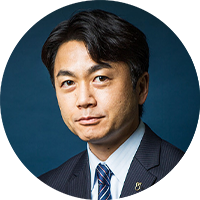Coach's VIEW is a business column authored by executive coaches in COACH A, aimed at providing valuable insights and effective approaches for leveraging coaching to foster organizational and leadership development. The column draws on the latest coaching trends and data, as well as insights from notable global publications on coaching.
What Generates Your "Curiosity"?

"I do not mind being coached, but I'm not going to change myself." Tom, the executive of a financial institution, told me at the beginning of our first session. "I have been told that I should listen to others, but to be honest, I do not feel comfortable doing so. I know the business better than the other employees. I never say this out loud, but this is how I really feel." It sounded to me that he was telling me his honest feelings.
Although Tom had received danger signals for performance targets several months ago via the employee survey, he did not indicate any curiosity about the results. The same kind of danger signals had been sent out before the Titanic sank, but there was no indication that the captain was curious about the situation or asked for additional information.
However, Tom changed drastically over the next several months and began to ask questions to the others on his own. It was not because he followed someone's advice to "ask more questions," but because a sense of "curiosity" emerged within him.
What exactly happened to him?
Constantly Share Different Perspectives
"I know what I am doing, and I am right."
Tom truly believed it. My role as a coach is not to disagree with it, but to explore with Tom the possibility of perceiving reality from a different angle. And Tom did not reject that process.
Salary raise/promotion, position/authority, success/failure, boss/subordinate...
The meanings and weight Tom gave to these words when he used them were often very different from the image I had towards these words. For example, Tom's interpretation of a "great person" sounded quite new to me. When I asked him what he meant by "great" and if that word had so much significance, and also told him that I could not sense it the same way, Tom seemed surprised.
We continued to share our thoughts about concepts that felt differently for each of us, in an unreserved and open-minded manner.
When Is Curiosity Generated?
One day, Tom said,"I am sometimes surprised when you tell me 'I do not think that way, I have a different perspective' during our sessions, because I used to think that if something was so true for me, everyone else must be thinking the same way that I do. Through our coaching journey, I started thinking that I might have had many assumptions."
We continued dialogue, continuously sharing our different perspectives. Tom gradually began to ask me "What do you think of this?". He had never done this before. I came to notice that Tom started showing a new curiosity that I had ever seen before.
People say that curiosity is generated when a person lacks understanding about something, or when a person starts to understand something (*). For example, when we do not know anything about a topic, we might become unsettled, and want to know more about this topic. This might be the same mechanism behind Tom asking more questions.
Also, as he learned more and more about himself, he became more and more curious to learn more about himself.
Exquisite Uncertainty
"In the past, I did not have any curiosity to listen to my team members at all. However, after I started talking with my coach, I gradually realized that I did not know how they observed me, and I became interesting in asking, 'How do you observe me from your point of view?'"
With each session, Tom began to talk about what he was experiencing and what he was discovering with more excitement. He also told me that this feeling came from his genuine "curiosity".
"Curiosity" is something that is innate in all of us, but we know that it actually diminishes when there is a lack of understanding or comprehension. In other words, when we fall into the extremes of overconfidence or lack of self-confidence, our curiosity diminishes. And it is said to be at its best in the in-between state of "exquisite uncertainty"(*).
"I feel that this concept of 'curiosity' and the presence of a coach are somehow interrelated." Tom said.
In response to this point made by Tom, I looked into various researches and came across an extremely fascinating study. When you observe the behavior of children in a room where they wait for their mothers, children with a difficult parent-child relationship tend to stay with their mothers after their mothers enter the room, while children with a stable parent-child relationship begin to search for toys in the room after their mothers enter the room (*).
It is said that when people are supported by fulfilling interpersonal relationships, they naturally become curious about their surroundings, and begin to explore.
It made some sense to me. When the stability of fulfilling relationships and the instability of dialogue that brings different perspectives converge, "exquisite uncertainty" appears, and curiosity, which is the fundamental point of change, sprouts, naturally igniting a journey of exploration.
REFERENCE:
* Ian Leslie (Author), Ayako Sugawa (Translator),
Children Ask 40000 Questions:
The Desire to Know and Why Your Future Depends on It (Japanese Edition),
p.80 - p.92, Kobunsha, 2016
*Regardless of profit, non-profit or intranet, secondary use such as copying, diversion, selling etc. is prohibited without permission.
Language: Japanese

